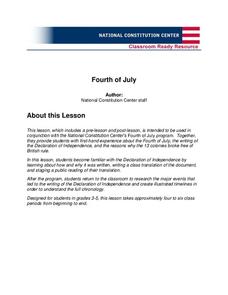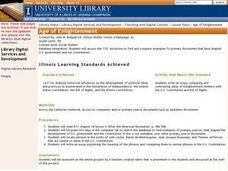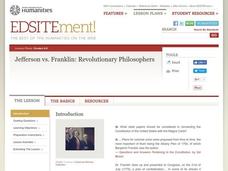Curated OER
Powers of Congress
Have your class fill out this comprehension sheet while reading about the powers of Congress. There are ten multiple choice questions focused on the rights, powers, and limitations of Congressional law.
Benjamin Franklin Tercentenary
Benjamin Franklin, Elder Statesman
Ben Franklin was the only American to sign The Declaration of Independence, the Treaty of Alliance with France, the Treaty of Paris, and the US Constitution. An interesting resource explores his role in the latter by comparing the US...
Shell Education
Leaders from the 1790s
The Founding Fathers contributed to the United States in many ways. Class members explore various Founding Fathers through research, group work, and realia. The final product of group work are posters and artistic representations of...
National Constitution Center
Fourth of July (Grades 3-5)
Bring history to life for your young scholars with a Fourth of July lesson series. After a class reading of the Declaration of Independence, students translate this pivotal document into layman's terms before working in small...
DocsTeach
U.S. v. Amistad: A Case of Jurisdiction
Just what is jurisdiction and why does it matter? A helpful activity takes academics on a journey to understand how judicial jurisdiction works. Scholars read excerpts from the Constitution and court documents to understand the process...
Curated OER
Running for Freedom: The FUgitive Slave law and the Coming of the Civil War
In order to understand the complicated nature of slave laws during the Civil War, learners compare and contrast an abolitionist poster and a runaway slave ad. They use an attached worksheet to consider each primary source document, then...
Heritage Foundation
The Powers of the Executive
Are executives as powerful as they sound? High schoolers find out about the US president and executive branch. A variety of activities include scaffolded reading sections, research assignments, and collaborative group work.
Center for Civic Education
What Is Authority?
Young scholars examine the concepts of power and authority as they begin learning about government in this elementary social studies lesson. Through a series of readings, discussions, and problem solving activities, children...
Judicial Branch of California
Our Government Today…What A System!
A group of citizens in North Canada has decided to leave their country, and they are asking for help in setting up an American-style democracy. Using a carefully structured activity, pupils lay out the principles in the American...
Constitutional Rights Foundation
Slavery and the Electoral College
How did slavery mold the creation of the US Constitution? The final lesson in the series focuses on how slavery impacted the creation of the Electoral College. Academics learn how the Electoral College was created because Southern states...
iCivics
Wanted: A Just Right Government
What type of government did American colonists gain and seek after gaining their independence after the Revolutionary War? Here is lesson that will guide your young learners through the new nation's progression from the Articles of...
Curated OER
Lesson 1: The Importance of Rules in Our Country and in Our Classroom
Explore the importance of rules in a community with the engaging first lesson of this series on the US government. To begin, children play a paper clip game that requires them to make up their own rules as they go, after which the...
Curated OER
Liberty for All: Voices from the Revolution
Did the Declaration of Independence really intend to grant liberty for all? Get your class thinking about historical perspective with documents relaying the experiences of women, white men, and African-Americans during the Revolutionary...
Constitutional Rights Foundation
The Troubled Elections of 1796 and 1800
Congress does more than create new laws. Political scientists delve into the elections of 1796 and 1800 to understand how political parties, the Electoral College, and personal agendas affected the election process. The resource also...
New York State Education Department
US History and Government Examination: June 2011
Those who lived during the Great Depression could clearly draw a line between the roaring 1920s and the desolation of the following decade. Class members examine these two periods and compare them using an essay question prompt and...
National Constitution Center
The Development and Application of the First Amendment
What are the limits on freedom of speech? While a cherished right in the Constitution, it is not unbridled. Budding historians consider what checks should exist on this liberty using news stories, court cases, and College Board prompts.
Judicial Learning Center
Judicial Independence: What’s Wrong with This Court?
Why is it important for judges to operate independently of politics or other branches of government? Scholars ponder the question as they examine video clips, case studies, excerpts of the US Constitution, and an interactive computer...
Judicial Learning Center
Separation of Powers/Qualifications of Office
Time to work together in class to understand the separation of powers as well as the qualifications for office! The resource includes terms to review for pre-knowledge before beginning instruction. Following the review, pupils work on a...
Constitutional Rights Foundation
The Census in US History
The census has been a part of the American landscape since the Constitution was written; however, it does have a history of controversy. Class members use a guided reading and simulation activity on developing census questions to...
Curated OER
Age of Enlightenment
Studnets compare example of primary documents that have shaped U.S. government and our Constitution.
Curated OER
Jefferson vs. Franklin: Revolutionary Philosophers
Students cite connections among Franklin's Albany Plan of 1754, his Plan of Confederation of 1775 and the U.S. Constitution and/or the Declaration of Independence. In an essay, they give examples of the philosophical and political...
Constitutional Rights Foundation
Special Order 40
The city of Los Angeles' 1979 Special Order 40 states: "LAPD officers shall not initiate police action with the objective of discovering the alien status of a person." After reading a fact sheet that details the history of Special Order...
iCivics
The “Supreme” in Supreme Court
Does a public school have the right to restrict what t-shirts students wear? Discover what happened when this question was brought to the Supreme Court, and review other major cases in United States history involving judicial review....
Curated OER
We the People: 270 out of 538
Students engage in a lesson that helps them better explain the quadrennial ritual surrounding the election of a president in the United States of America.

























